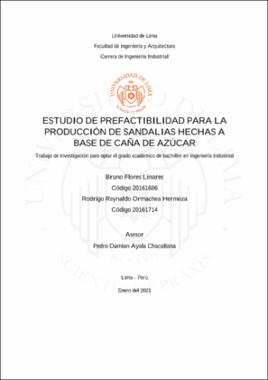Mostrar el registro sencillo del ítem
Estudio de prefactibilidad para la producción de sandalias hechas a base de caña de azúcar
| dc.contributor.advisor | Ayala Chacaltana, Pedro Damián | |
| dc.contributor.author | Flores Linares, Bruno | |
| dc.contributor.author | Ormachea Hermoza, Rodrigo Reynaldo | |
| dc.date.accessioned | 2021-03-18T00:57:07Z | |
| dc.date.available | 2021-03-18T00:57:07Z | |
| dc.date.issued | 2021 | |
| dc.identifier.citation | Flores Linares, B. y Ormachea Hermoza, R. R. (2021). Estudio de prefactibilidad para la producción de sandalias hechas a base de caña de azúcar [Trabajo de Investigación para optar el grado de Bachiller en Ingeniería Industrial, Universidad de Lima]. Repositorio institucional de la Universidad de Lima. https://hdl.handle.net/20.500.12724/12752 | es_PE |
| dc.identifier.uri | https://hdl.handle.net/20.500.12724/12752 | |
| dc.description.abstract | La presente investigación ha tenido como principal objetivo determinar la prefactibilidad de la producción de sandalias regulables, cuya materia prima esta compuesta principalmente a partir de la caña de azúcar, un recurso renovable de alta disponibilidad en el Perú. El concepto de producto se basa en 2 tendencias actuales en el mercado peruano, la reducción del uso de plásticos en la industria de calzado y el aumento de concientización de parte de las empresas hacia el uso de recursos renovables. Como parte de la metodología, se realizó un estudio de mercado, concluyendo en un mercado objetivo hacia NSE B, C y D, a partir de los 19 años de edad, en todo el territorio peruano. Además, se observó que se puede complementar la demanda proyectada al año 2023 con el apoyo de bienes complementarios. A partir de este cálculo, se obtuvo una demanda proyectada de 12496 cajas de 16 pares de sandalias, resultando en el tamaño de planta requerido para el desarrollo del proyecto. Como localización de planta, se seleccionó Lambayeque, ya que cuenta con alta disponibilidad de materia prima, mano de obra y cercanía a Lima. A partir del análisis financiero, se obtuvo como indicadores del proyecto un VAN de S/. 776,975.49, y un TIR de 27%, indicando los beneficios de la implementación del proyecto. Finalmente, entre los principales hallazgos se encuentra la reutilización del bagazo (merma) como fuente de energía para reducir costos de operación. Además, se plantea la implementación de un proyecto social que permita aumentar el valor agregado del producto y la imagen de la marca. | es_PE |
| dc.description.abstract | The main objective of this research project is to determine the prefeasibility of the production of adjustable sandals, which raw material is mainly composed of sugar cane, a highly available renewable resource in Peru. The product concept is based on 2 current trends in the Peruvian market: the reduction of the use of plastics in the footwear industry and the increase of companies’ awareness towards the use of renewable resources. As part of the methodology, a market study was carried out, concluding that the target market includes SES B, C and D, from 19 years of age, throughout the Peruvian territory. Furthermore, it was observed that the projected demand for the year 2023 can be supplemented with the support of complementary goods. From this calculation, a projected demand of 12,496 boxes of 16 pairs of sandals was obtained, As a result, this corresponds with the size of the plant required for the development of the project. Lambayeque was selected as the plant location, since it has high availability of raw materials, workforce, and proximity to Lima. From the financial analysis, a NPV of S /. 776,975.49, and an IRR of 27% were obtained, indicating the benefits of the project implementation. Finally, among the main findings is the reuse of bagazo (waste) as an energy source to reduce operating costs. In addition, the implementation of a social project is proposed to increase the added value of the product and the image of the brand. | en_EN |
| dc.description.uri | Trabajo de investigación | |
| dc.format | application/pdf | |
| dc.language.iso | spa | |
| dc.publisher | Universidad de Lima | |
| dc.rights | info:eu-repo/semantics/openAccess | * |
| dc.rights.uri | https://creativecommons.org/licenses/by-nc-sa/4.0/ | * |
| dc.source | Repositorio Institucional - Ulima | |
| dc.source | Universidad de Lima | |
| dc.subject | Caña de azúcar | en_EN |
| dc.subject | Proyectos industriales | en_EN |
| dc.subject | Estudios de prefactibilidad | en_EN |
| dc.subject | Sandals | en_EN |
| dc.subject | Shoes | en_EN |
| dc.subject | Sugarcane | en_EN |
| dc.subject | Industrial projects | en_EN |
| dc.subject | Prefeasibility studies | en_EN |
| dc.subject | Sandalias | es_PE |
| dc.subject | Calzado | es_PE |
| dc.title | Estudio de prefactibilidad para la producción de sandalias hechas a base de caña de azúcar | es_PE |
| dc.type | info:eu-repo/semantics/bachelorThesis | |
| thesis.degree.level | Bachiller | |
| thesis.degree.discipline | Ingeniería Industrial | es_PE |
| thesis.degree.grantor | Universidad de Lima. Facultad de Ingeniería y Arquitectura | |
| dc.publisher.country | PE | |
| dc.type.other | Trabajo de investigación | |
| thesis.degree.name | Bachiller en Ingeniería Industrial | |
| renati.advisor.orcid | https://orcid.org/0000-0003-1607-2263 | |
| renati.discipline | 722026 | |
| dc.identifier.isni | 0000000121541816 | |
| renati.author.dni | 73367178 | |
| renati.author.dni | 72394698 | |
| renati.level | https://purl.org/pe-repo/renati/level#bachiller | * |
| renati.advisor.dni | 21411719 | |
| renati.juror | Noriega-Aranibar, María-Teresa | |
| renati.juror | Cabrera-Gil-Grados, Ezilda | |
| renati.juror | Hernandez-Gorritti, Wilfredo | |
| renati.type | https://purl.org/pe-repo/renati/type#trabajoDeInvestigacion | * |
| dc.subject.ocde | https://purl.org/pe-repo/ocde/ford#2.11.04 | |
| ulima.cat | OI |



